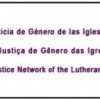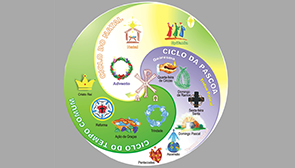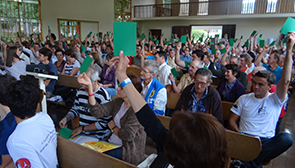Bible Study 11
Pastor Carmen Michel Siegle
Evangelical Church of Lutheran Confession in Brazil
Luke 15.1-10
Listen to the text
Jesus liked to tell stories to teach people about many things, especially about God. In telling these stories, called parables, Jesus used examples from everyday life and compared them with the kingdom of God and His justice.
On one occasion, Jesus was criticized by a group of religious leaders, who accused him of showing mercy to the most vulnerable people, he told three parables to talk about the search, the joy and the love of God.
In today's study, I invite you to reflect on two parables that are in the Gospel of Luke: the lost sheep and the lost coin. While reading from Luke 15: 3-10
a) Observe the movements, feelings and attitudes present in the text;
b) Think about what caught your attention in these parables.
c) Share your impressions of the text with someone, if possible.
Reflect from context
Jesus did not discriminate people. He lived and had fellowship with all kinds of people. For him, the life of each person matters. He said, “I have come that all people may have an abundant life” (John 10.10). However, the Pharisees and scribes, who were teachers of the law and strict in its observance, did not agree with Jesus. They could not agree with him living together and having table fellowship with people considered impure and sinful. In response to these criticisms and the exclusivist ideas of this group, Jesus directs the attention of the people who listened to him to the daily life of a man who had 100 sheep and a woman who had 10 coins.
In Jesus' day, shepherds had no social recognition. Likewise, women were not valued. Domestic activities were not considered important, precisely because they were performed by women. A woman who lived independently from her father or husband was considered to be on the margins of society. Jesus speaks of God's merciful action from the experience of these people.
A sheep was an important animal for family survival. It was a source of income, food and raw material for the production of clothing. The man leaves the 99 sheep to go after the missing one. Not because she was worth more than the others, but because she was also important. A sheep strayed from the herd is weakened. So when the shepherd finds her, he puts her on his shoulders and takes her home, together with the other sheep. The return of this sheep is cause for joy for the shepherd and for the whole family, so, he calls people, friends and neighbors to party with him.
The coin was roughly equivalent to the value of a day of manual labor. If compared to today, we would say that it was worth a day or two of house cleaning, since this domestic service is less valued than the service performed by men. In telling the parable, Jesus does not say whether this woman lives alone, whether she is a widow, whether she has children to support. The parable does not speak of this. What we do know is that the lost coin is essential for the woman. So important that she gets organized carefully to look for the lost coin. She lights a lamp, searches the corners of the house, the cracks, the holes, sweeps under furniture, rugs, behind cabinets, looks inside drawers, removes dust, visits many places ... And when she finally finds her coin, she rejoices, gathers her friends and neighbors to celebrate with her.
Each person in the parables acts in his or her own way. Both, men and women, recognize the immense value of what was lost, therefore, they search with dedication for the sheep and the coin.
It is possible that for many people this search is too exaggerated, but for those who live on few resources, as in the case of this poor man and this poor woman, the guarantee of survival is a reason for happiness. A happiness that is shared with friends and neighbors. In other words, there are bonds with other people, there are bonds with other women, something so necessary and important in this time of social distancing because of Covid19. The women, friends, neighbors, partners in struggles who certainly live in similar situations, not only understand the woman, but also celebrate with her. Thus, God rejoices and celebrates when in his word we find consolation, liberation, transformed and shared life.
In the persistent and careful search of the shepherd and the woman, Jesus teaches that God's mercy does not leave anyone behind; that distance is not an obstacle for God's love and care to reach us; and that the house should not be a place of hierarchy and isolation, but a place of sharing and inclusion, here men and women have the same value and together they are at the service of the Kingdom of God.
In the footsteps of Jesus, the community is discovering that in the Kingdom of God there is a place for all people, without distinction, starting with the lives of the most oppressed, forgotten and excluded (vv.7-10). And, that the love of God, the consoling and liberating gospel, when experienced, needs to be shared so that other lives are reached and equally transformed.
Chat with the text
Looking at the environment in which you live, reflect the following questions:
- What does this text have to do with me?
- What do I miss and need to find?
- How do I perceive my home, my family, my community?
- What are my bonds of trust, people who are close to me that I can count on to rejoice with me or to help me in my difficulties?
- What is the good news that the text brings me?
To finish
Turn everything you discovered with this study into prayer.






















